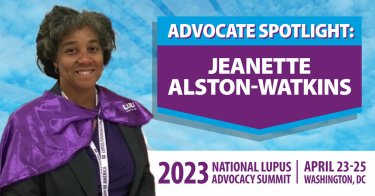Jeanette Alston-Watkins: A Voice to be Heard

Jeanette Alston-Watkins was a year away from completing her MBA when she began to feel a shift in her life. At first she attributed the fatigue to the mounting stress of her graduate school studies.
With one year left in her MBA program, she received life-changing news: her lupus diagnosis. Her diagnosis was the culmination of a four-year journey that included countless doctor visits and unexplained symptoms.
“I stopped sweating while working out, my joints, knees and muscles hurt, and I had a chronic sinus infection that lasted almost a year. An allergist ran a test after a year of antibiotics and trying allergy shots and discovered I had lupus.”
The news came as a shock to Jeanette.
But, she was determined not to let lupus define her. Jeanette immediately began searching for answers on how to help herself and her family through the challenges of navigating lupus.
Her search brought her to the Lupus Foundation of America, and the countless resources and programs that are offered. She decided to attend a support group meeting to network with others with lupus. The more that Jeanette spoke to others living with lupus, the more comfortable she got talking about the disease and its impact on her with more people. She then decided to get directly involved in advocating for people with lupus.
Jeanette’s first National Lupus Advocacy Summit was the perfect forum for her to get involved directly and share her story with members of Congress to make a difference in the fight against lupus, especially for those living with the disease who cannot always advocate for themselves.
“For me to get the opportunity to speak to my members of Congress and see how they can support our fight, is such a fantastic feeling.You’re making a difference not only for you or someone else right now, but for the future patients and families that will be living with this invisible disease that creates so much havoc on our bodies, our lives, our families and on our relationships.”
Jeanette knows advocating for meaningful change isn’t an easy feat. She suggests incorporating advocacy in every aspect of life.
“I ask people if they advocate for themselves at the doctor’s offices, their jobs, their lives? If they can do it there, they can start sharing their stories and making a difference on a bigger scale.”
The collective effort she experienced at the multiple National Lupus Advocacy Summits she has attended over the years has brought her optimism and a sense of community.
“From the time you arrive, the check ins, the catching up with old friends, the exhibit hall, the speakers sharing the latest lupus research, new friends, the meetings, the training for the Hill, then come Advocacy Day – the excitement of getting ready to make a difference in lupus history is so exhilarating.”
The past few years have presented some challenges with the emergence and proliferation of the COVID-19 pandemic, which resulted in the Summit taking place in a completely virtual environment.
While Jeanette was grateful and eager to participate virtually, she recognizes the significance of in-person meetings.
“The face-to-face appointments with members of Congress can show them what some people with lupus are living with. It’s more emotional in live sessions versus virtual.”
After four years away from Capitol Hill, Jeanette is ecstatic to return and make her voice heard, reunite with old acquaintances, and learn more about the new research being conducted on lupus.
“Making a difference begins by showing up. That’s when the magic starts, meeting people, hearing everyone’s stories, knowing you’re not alone, listening to the research that is being done, visiting Capitol Hill and making a difference by speaking to Congressional offices on Capitol Hill.”
For those wondering if they should attend the Summit for the first time, Jeanette has some advice.
“Don’t take it from me, come see it for yourself. Feel the excitement of learning more than you can imagine about lupus, making a difference, not only for you, but others after you. Come meet other lupus patients, advocates, children, and LFA staff that all make a difference in this lupus world we live in and be a part of lupus history.”
There’s no better time than now to get involved in the fight to end lupus! Sign up today to attend the National Lupus Advocacy Summit, taking place April 23-25.



